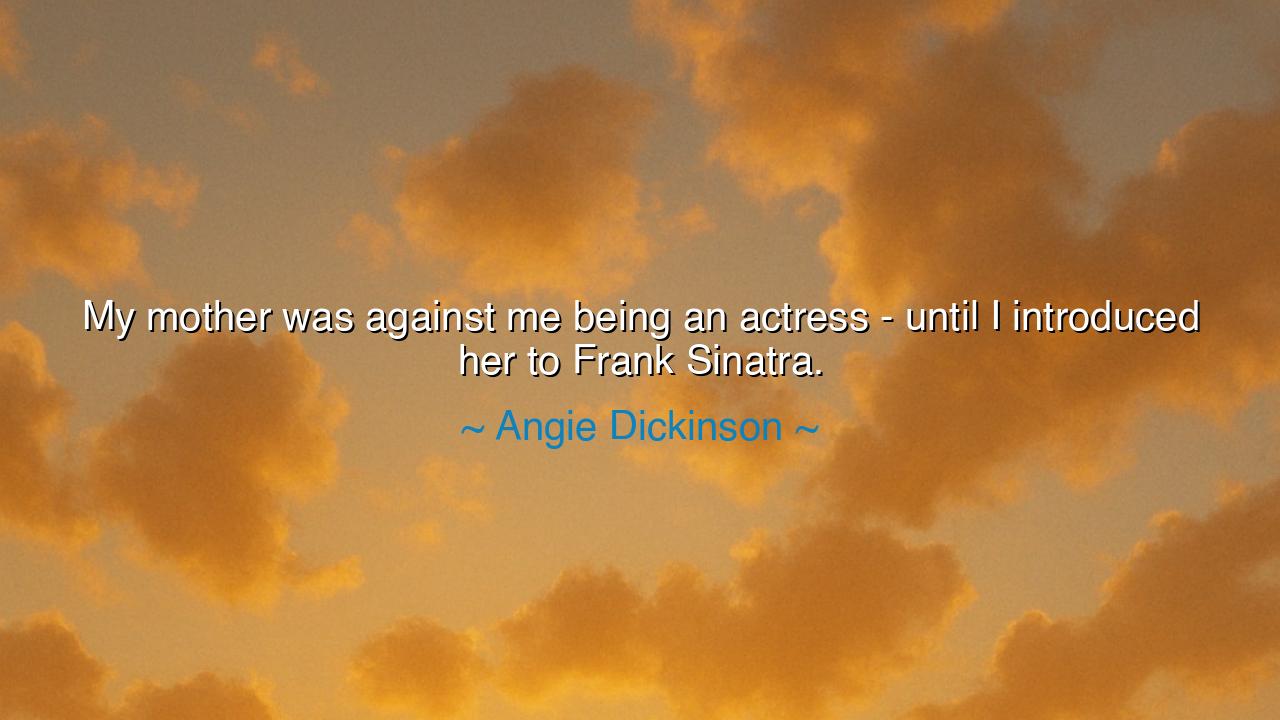
My mother was against me being an actress - until I introduced






The luminous Angie Dickinson, a woman of wit and grace, once declared, “My mother was against me being an actress — until I introduced her to Frank Sinatra.” At first, these words appear as a jest — a daughter’s playful wink at the vanity of the world. Yet beneath their sparkle lies an ancient truth about approval, ambition, and transformation. Her remark is not merely about fame or charm; it is about the mysterious way that success alters perception, the way that love or pride can melt even the hardest disapproval. It tells us that conviction often walks hand in hand with circumstance, and that the hearts of those we love may change not through argument, but through achievement and grace.
In her youth, Angie Dickinson faced what many dreamers endure: the doubt of those closest to them. Her mother, like many guardians of old, feared the dangers of the stage — the unpredictability of the artist’s path, the exposure, the rejection, the loss of virtue and certainty. Such fears were not cruelty but protection; the parent sees the storm where the child sees the light. Yet Dickinson’s story, told with humor, reveals the universal dance between generations — between the dreamer who reaches beyond safety and the elder who clings to it. Her mother’s heart was not changed by persuasion, but by encounter — by witnessing her daughter’s world become real, embodied in a name both magnetic and legendary: Frank Sinatra.
To the ancients, this story would not be strange. They spoke of how the gods themselves changed the hearts of mortals not through words, but through manifestation. When Odysseus returned home in disguise, his wife Penelope doubted him until she saw the mark of their shared secret — a sign that proved his truth beyond argument. So too did Dickinson’s mother, upon meeting the living proof of her daughter’s success, understand that what once seemed foolish ambition had become destiny fulfilled. Her daughter’s dream had drawn her into the orbit of greatness, and thus her skepticism dissolved into pride. It was not Sinatra himself who changed her, but what he represented — the undeniable evidence that her child had not been lost to fantasy, but lifted by it.
Yet the humor in Dickinson’s words holds another layer: a gentle reflection on human nature. We often doubt what we cannot see. A dream is fragile until it takes shape, and the familiar rarely commands respect until it touches the extraordinary. How often do we withhold belief until the world gives us a reason to believe? Dickinson’s mother did not become faithless; she became human again — reminded that every great endeavor begins in uncertainty and that sometimes, faith must follow proof. The daughter, once dismissed, became the bridge between ordinary life and the realm of stars.
History, too, echoes this pattern. Consider the tale of Vincent van Gogh, whose genius was unseen in his own lifetime. The world laughed at his devotion to color and form, and even his own family doubted him. Yet when his works were finally displayed, generations after his death, the same world that ignored him began to revere him as a master. Those who could not understand his vision in life now celebrate it in eternity. Dickinson’s anecdote, though lighter in tone, carries the same eternal lesson: that belief often trails behind courage, and that recognition comes when the invisible becomes visible.
So, what wisdom should we take from her words? It is this: walk your path even when others cannot see where it leads. Do not wait for approval before beginning, for approval is the harvest, not the seed. Show kindness to those who doubt you, for they, too, are bound by fear and love. In time, when your work bears fruit, when your light touches the lives of others, those who once resisted may become your greatest champions. The transformation of disbelief into pride is one of the sweetest victories of the human spirit.
Therefore, let her quote serve as both laughter and law: that success is the language through which dreams become believable. But remember also that success is not for vanity alone; it is to teach others that their fears were unnecessary. Go forth, then, with persistence and good humor. Endure the doubt, pursue the art, and carry the warmth of forgiveness. For when the moment comes — when you, too, introduce your doubters to your own “Frank Sinatra” — may you greet them not with pride, but with love. For their faith, though late, will have been hard-won and real.






AAdministratorAdministrator
Welcome, honored guests. Please leave a comment, we will respond soon